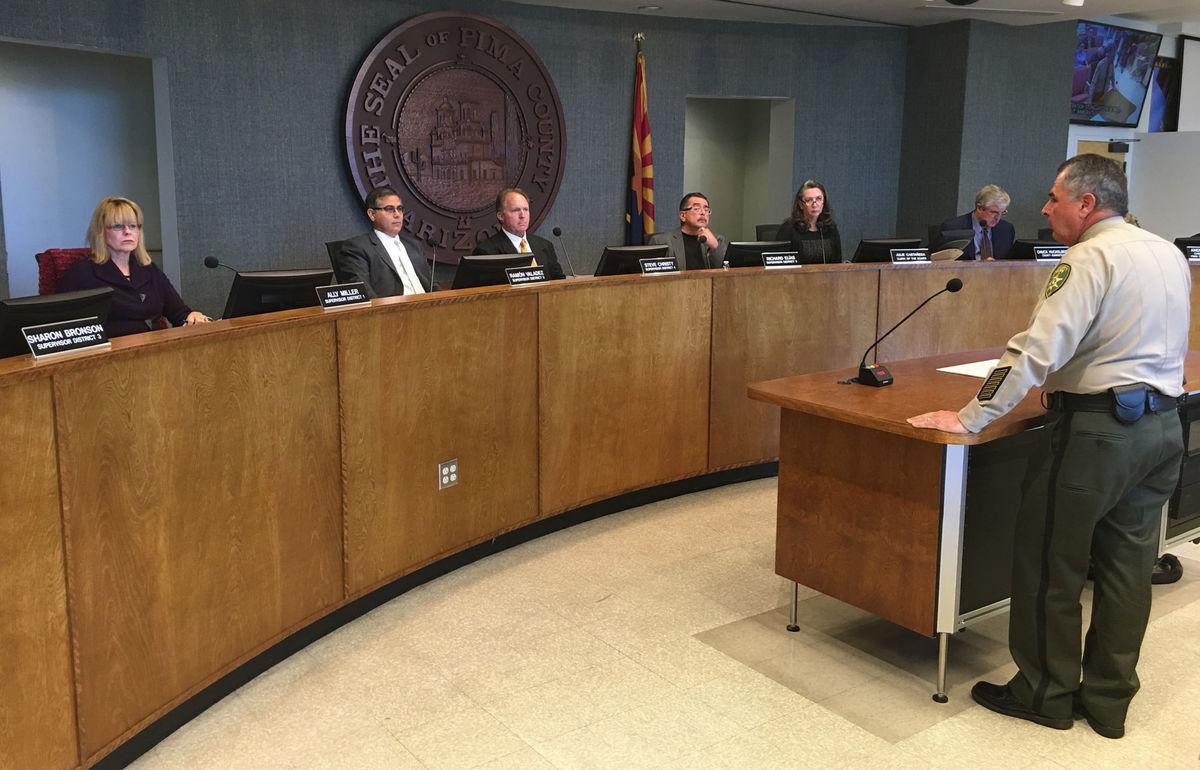A monthslong fight over Pima County’s acceptance of a federal border-security grant might be somewhat moot, since the Sheriff’s Department has been spending the money while the Board of Supervisors continues to wrestle with the decision.
In February, the Pima County Board of Supervisors reversed an earlier decision to reject roughly $1.4 million in Operation Stonegarden funding, which covers overtime, mileage and equipment costs for the Sheriff’s Department in an effort to encourage collaboration between local and federal law enforcement agencies.
At the time, Supervisor Ramón Valadez, who previously voted against accepting the funding, changed his vote and approved the funds with the implementation of five conditions: That all employee-related expenses associated with the grant be completely covered, the establishment of a new grant coordinating process for federal funds like Stonegarden, tracking of the financial impacts on other elements of the criminal justice system, development of a formal policy regarding deputy interactions with federal officers and the creation of a new committee to look at the issue of racial profiling.
In March, the supervisors delayed approval of a separate grant through the High Intensity Drug Trafficking Area program, saying that the Sheriff’s Department had not yet met the conditions associated with accepting the Stonegarden funding. At the time, Pima County Sheriff Mark Napier said that his department had met the conditions and that tying Stonegarden to HIDTA wasn’t good public policy, since the two grants are separate and distinct.
As spring turned to summer, public outcry over federal immigration activities reached a fever pitch with the separation of families at the border and thousands of children being taken to immigration detention facilities across the country.
Supervisor Richard Elías said the situation changed when President Trump made the issue a focus of his agenda and started using law enforcement for political ends, causing some of the supervisors to rethink whether the county should accept the Stonegarden funds.
“I worry about the sheriffs, I want to support them,” Elías told the Star on Thursday. “I want people to believe that (the deputies) are on their side.”
By accepting Stonegarden funding and allowing ICE representatives into the jail, Elías worries that the Sheriff’s Department is hurting its credibility with the public.
“We ultimately can’t control the Sheriff’s Department, but we can try to ensure that they’re acting in the best interest of everyone living here,” Elías said.
And while Elías said that he doesn’t believe Napier to be a bigot, he said he finds the sheriff’s lack of transparency over his use of the funds to be troubling, saying that he became aware the department was using the money last week, but not from the sheriff himself, who has failed to mention that fact during months of public discussions in board meetings and with the community.
“We’ve been having conversations all summer with the public about this,” Elías said. “Where did we become disconnected?”
However, since approving the Stonegarden funding, the supervisors have not taken any formal action to suspend the contract. As of Friday, the department had spent $564,972 of the grant money, Napier said.
Elías acknowledged signing the contract with the Department of Homeland Security in February after the supervisors voted to approve the funding but said he believed Napier stopped using the funds once the supervisors decided earlier this summer to vote again on the issue.
“We can act with candor and be honest about where we stand,” Elías said. “This is a really good discussion and it’s critical that it takes place.”
That vote has since been delayed several times and is scheduled to take place during the Sept. 4 meeting.
When the Star spoke to Napier about potential repercussions of the delay, he said the department had been operating under the assumption that the funding would be approved and that officials were preparing the application for the next round of Stonegarden grants, which Napier said would likely include even more money.
The supervisors’ procrastination in accepting this year’s grant could put the status of next year’s application in jeopardy, Napier said, and if the board votes to reject the funding, the federal government could ask for equipment back.
“Rejection of the funds is saying that the plight of the undocumented and the mission of public safety would be better served if the Pima County Sheriff’s Department was not there,” Napier said. “The money doesn’t go away, it’s reallocated to other counties.”
The county has been accepting Stonegarden grants for the past 12 years without hesitation and has received roughly $10 million in overtime funding and $6 million for equipment, Napier said.
The funding allows the department to deploy deputies to under-served and remote areas in the county, but doesn’t require the department to proactively enforce immigration laws. If PCSD isn’t patrolling those areas, it’s likely that additional federal or state employees would be sent to the area, with the county being unable to exercise any control over either of those entities, Napier said.
If the county rejects the funds, it will also lose its seat “at the table” when it comes to discussions about immigration and law enforcement, which would be a significant loss, Napier said.
“When we remove ourselves from participation, there’s no longer any reason to listen to us,” he said.
There’s a clear connection between public safety and the department’s involvement in Stonegarden, with the influx of drugs coming across the border representing a serious public safety and public health crisis, with human and sex trafficking in the remote areas of the county also representing legitimate public safety concerns, Napier said.
“This is literally free money,” Napier said. “Locally, things are better than ever before.”
The Sheriff’s Department has been engaging in talks with the ACLU and increasing communication on the issue with concerned citizen groups, Napier said.
But while Napier says that things are better than ever before, Elías has the opposite opinion.
“My community is scared,” Elías said. “This strikes at the heart of the borderlands and how we’ve lived for centuries.”





